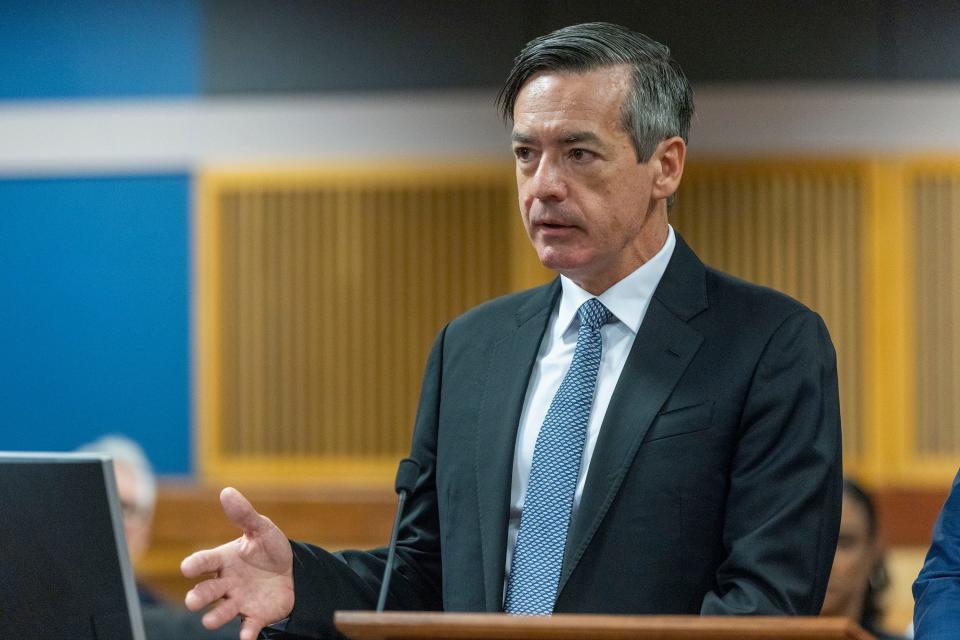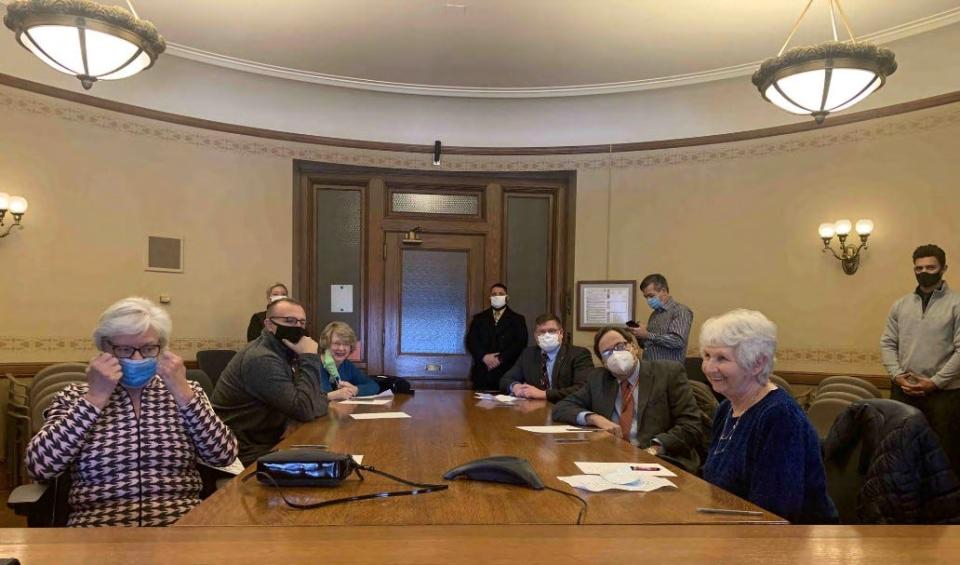Attorney Kenneth Chesebro posted Jan. 6 theories on social media as 'BadgerPundit'
- Oops!Something went wrong.Please try again later.
MADISON – A Wisconsin native at the center of Donald Trump's 2020 scheme to stay in power tweeted anonymously under the name "BadgerPundit" in the days following Trump's reelection loss, promoting theories on how the former president could avoid leaving office.
Kenneth Chesebro, a former campaign attorney for Trump, used the Twitter account to urge Republicans to use Trump electors or Republican-led state legislatures to overturn Trump's loss and concealed the account from Michigan prosecutors probing the scheme, according to new reporting from CNN and Talking Points Memo.
Chesebro, who is helping investigators in at least four states who are probing the scheme to overturn the 2020 election, initially denied using the social media platform formerly known as Twitter or having “alternate IDs” when asked by Michigan investigators in 2023 but has since confirmed to CNN he used the BadgerPundit account.

According to Talking Points Memo, the account live-tweeted the Jan. 6, 2021, attack on the U.S. Capitol "sparring with law professors" and "floating ideas similar to those that Chesebro was offering to the Trump campaign." The account also suggested then-Vice President Mike Pence could “impose a 10-day pause, to allow investigation & give the state legislatures a chance to weigh in.”
Two days before Jan. 6, the account posted a video of a man outside the U.S. Capitol screaming “Do Not Certify,” promoted Trump's rally outside of the Capitol, and tagged Trump operatives, according to TPM.
The account tweeted more than 50 times that Pence could count the false Trump electors in the final tally, according to CNN.
Chesebro initially told Michigan prosecutors he felt “misled” by the Trump campaign about the fake elector plan but the BadgerPundit account also defended the plot. The blog associated with the social media account dates back to 2011, inspired by the Act 10 legislation that spun Wisconsin politics into turmoil.
Attorneys for Chesebro told CNN "there’s clearly a conflict” between what Chesebro told investigators and what he tweeted.
Chesebro was present during the Dec. 14, 2020, meeting of 10 Republicans in the Wisconsin State Capitol where documents claiming to be electors for Trump were signed, despite Trump losing reelection in Wisconsin.

The group met after Trump's election loss had been confirmed by Trump-financed recounts and lawsuits. Two longshot appeals were still in the works at the time of the meeting and were ultimately unsuccessful.
Biden beat Trump by about 21,000 votes in Wisconsin. Trump sought recounts in Dane and Milwaukee counties, which confirmed Biden's win. Trump sued and the state Supreme Court upheld the results on a 4-3 vote on Dec. 14, 2020 — the same day the group of Republicans met to sign the paperwork falsely claiming to be electors.
The group of Wisconsin Trump electors in December settled a civil lawsuit filed against them by electors for President Joe Biden. As part of the settlement, the 10 Republicans issued a statement acknowledging their actions were used to try to overturn an election, agreed not to be electors for Trump in the future, and did not admit guilt.
More: Wisconsin fake elector tells ‘60 Minutes’ he was afraid of Trump supporters
The lawsuit also named Chesebro and Wisconsin attorney Jim Troupis as defendants, who are still scheduled to stand trial in September. Troupis represented the Trump campaign in 2020.
At the time, the fake Trump electors said they held the meeting to ensure the state's electoral votes were cast for Trump if a court later determined he was the true winner of the state.
The plan was spelled out by Chesebro in a memo dated Nov. 18, 2020 — the same day Trump asked for recounts in Dane and Milwaukee counties.
More: Here are the ways Ron Johnson, others with Wisconsin ties appear in the Trump Jan. 6 indictment
Chesebro sent the memo to Troupis, the attorney who oversaw Trump's post-election legal strategy in Wisconsin and is also a defendant. It's unclear whether Chesebro worked for Trump or someone else. Chesebro sent a second memo on the matter on Dec. 9, 2020, after state officials certified Biden as the victor in Wisconsin.
The filings from the fake electors in Wisconsin and elsewhere were used by Trump and his allies to argue the results were in dispute as they tried to prevent Congress from finalizing them.
Republicans in Arizona, Georgia, Michigan and Nevada also signed documents purporting to be electors. Republicans in New Mexico and Pennsylvania filled out paperwork saying they should be considered electors if courts found Trump had won their states.
Molly Beck can be reached at molly.beck@jrn.com.
This article originally appeared on Milwaukee Journal Sentinel: Chesebro posted Jan. 6 theories on social media as 'BadgerPundit'

